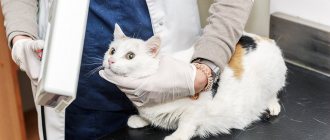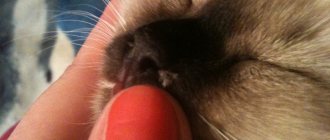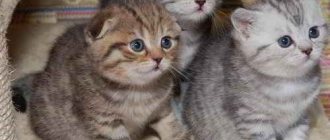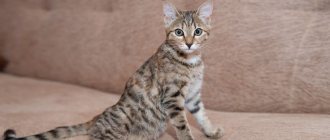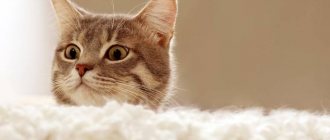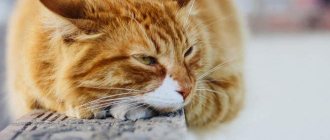Causes
Let's look at the objective causes of obesity in cats. The most common of them is overfeeding. Many people think that the cat knows when to stop, so they pour more of everything into the bowl. As a result, the mustache may overeat, which will certainly lead to excess weight.
The most common
- Incorrect feeding.
You can feed little by little, but incorrectly (we will explain what is correct later), which leads to metabolic disorders. - Metabolic disease
. When metabolism “deviates from the norm,” then 2 scenarios are possible. Either the cat becomes very thin (this is observed with an accelerated metabolism), or the cat becomes obese (if it is slow). It is disrupted by poor nutrition (including due to mixing or alternating natural food and dry food), and due to an infectious disease, and even due to diabetes. - Little physical activity
. If the pet is extremely lazy, does not want to move, or does not have enough space for active games, then sooner or later the cat will begin to deposit fat on its sides. - Predisposition
. Sometimes the tendency to be overweight in cats is inherited (for example, the British breed), and you need to be very careful when feeding such pets! Overfeeding or imbalance will certainly lead to the fact that instead of an active purr, you will have a furry bun lying on the sofa.
Hormonal disorders
As soon as the hormonal background changes, everything in the body malfunctions. Here, not only is the cat obese, but the coat also becomes much worse, and the skin may lose elasticity. The background may be distorted due to the fact that some gland is not functioning well (pancreas, thyroid, in females - ovaries, as well as other glands). Therefore, if you notice that your mustache has begun to gain weight, although you feed it the same, it runs around as before, take your pet to the veterinarian! Hormones are no joke.
Castration and sterilization - as causes of obesity in cats
Some people notice that cats after castration and cats after sterilization gain weight. And they are trying to “push” this change in the mustache’s body into the operation (consequences). In fact, cats become overweight because their metabolism changes. After all, the testes and ovaries are not just organs, but glands of mixed secretion. Their removal leads to changes in the animal's hormonal levels. And this change will certainly entail a jump in weight. Therefore, operated mustaches need to be fed in a special way.
If you feed your pet dry food, then you need to switch to special food for castrated/sterilized cats. Don't skimp on food. Be sure to supply clean water, which you will constantly change. It is better to filter the water, otherwise there is a high risk that insoluble salts from tap water can lead to the development of urolithiasis in cats. If you skimp on water when feeding dry food, then again ICD may disturb your four-legged purr.
Owner behavior
Caring for a pet during its treatment requires changes in the behavior of the owner himself. He should set an example, in particular, forget about often sitting in a chair or lying in bed. You will have to work with your pet more often, captivating him, not allowing him to constantly sleep or even just lie down. It's good when children in the family involve the cat in their games. At the same time, you should not limit her movement.
A cat has no business being in the kitchen or near the table during family meals. It is necessary to immediately take it to its place. The animal should receive food only in a separate area, remote from both the kitchen and its “bedroom”. “Begging” and accepting food from the common table should be strictly prohibited. Feeding should be done only according to the established regime and diet. No extra treats. Affection and encouragement should not be associated with food. The remaining food in the bowl is removed after feeding.
It is necessary to regularly monitor the weight of your pet. Weighing should be done daily, recording the readings. It is important to identify the general trend of changes. If a slight but stable weight loss is observed, treatment must be continued. If no effect is detected, you should contact your veterinarian again. You may have to change your approach to diet and switch to special foods.
Special care is necessary in the presence of pathological internal causes of obesity associated with chronic diseases. In this case, the doctor must accurately diagnose the pathology and prescribe medication. The owner’s task becomes the timely administration of prescribed medications.
Symptoms
How to identify symptoms of obesity in cats. First, the cat’s ribs “swim.” The more excess weight, the more difficult it is to feel them. Over time, they become increasingly difficult to see. Even breathing movements become almost imperceptible. It's harder for the cat to walk. “Duck” gait, as if waddling from paw to paw. It’s one thing when a cat is carrying kittens, this is physiology, but when a non-pregnant purr waddles around like that, you definitely need to pay attention to it.
See the pictures below to know exactly how to determine the degree of obesity or malnutrition in a cat, as well as familiarize yourself with the normal weight of a pet depending on breed and gender.
PHYSICAL EXERCISE FOR A CAT ON A DIET
This is equally true for both humans and cats. Successful weight loss is impossible without exercise and physical activity. Don't worry, your cat won't have to sweat on the treadmill or do cat aerobics. The most effective exercise is based on what the cat loves most, namely hunting. Awaken your cat's predatory instincts with daily interactive play sessions.
Leave active play toys filled with kibbles of dry food in different rooms (reduce the amount in the bowl accordingly so as not to increase your cat's overall food intake). The cat will have to work hard to get food from the toy. She will have an interesting activity, and at the same time, in the end she will receive an edible reward every time.
Why is obesity dangerous?
Obesity in cats is by no means harmless, as it might seem at first glance. What is the danger?
| Musculoskeletal system | Huge load on the musculoskeletal system. The joints suffer greatly and become deformed. With excess weight, a cat is no longer so jumpy, not so dexterous and mischievous. And this only leads to the fact that there is even less physical activity, weight increases even more, and metabolism becomes slower and slower. And if the thick mustache decides to jump, then his joints will have a very hard time. |
| Internal organs | Of course, they have their own fat around them that protects the organ (something like a “pillow” that softens shocks). But if the amount of fat exceeds the norm, then the organ begins to “degenerate”, and the animal develops fatty degeneration (the liver is the first to suffer). |
| The cardiovascular system | We must not forget about the cardiovascular system. The vessels are full of plaques, and atherosclerosis develops. It becomes more and more difficult for the heart to pump blood. Organs do not receive enough oxygen and nutrients because of this. |
| Metabolism | Obesity is not only a consequence of diabetes, but can also provoke its development. Therefore you need to be very careful. And as soon as a cat appears overweight, immediately start feeding it and look for the cause of obesity! Otherwise, after some time you will have to treat a cat with diabetes. |
How to determine obesity and its stage
For mustachioed pets there is no single standard for body weight. The numbers are influenced by gender and breed. It is dangerous when the average for a particular individual increases by 15-20% or higher.
Obese cats are characterized by a leisurely gait, shortness of breath, frequent fatigue, and sagging belly. Fat deposits in the lower abdomen are easily palpable and clearly visible due to the thick folds on the belly and sides.
What to do?
How to deal with obesity in a cat? The first step is to seek help from a veterinarian. This is necessary in order to exclude diseases (chronic or associated with the endocrine glands). The veterinarian will recommend how and what exactly to feed an obese pet.
Don't expect miracles that your cat will quickly lose weight and become slender if she is overweight. No. The kilograms should go away gradually - and this will be a normal process of losing weight. And the closer to normal, the slower the fat goes away.
No hunger strikes
Never starve an animal!!! This will not only aggravate the problem and slow down the metabolism, but will also lead to the development of other diseases (gastritis, ulcers, enteritis and others). It is better, on the contrary, to feed more often, but a little at a time. Very small portions. Roughly speaking, the daily food intake must be divided into equal portions (by the number of times you will feed, for example, 3-4).
This will cause the stomach to gradually shrink. The amount of energy needed per day will remain the same, but it will only arrive gradually. And if the body needs it, it will begin to break down its supplies. It’s as if the body understands that it no longer needs to “hamster” or store, because there will be food. This principle is called fractional. It is widely used in people suffering from excess weight.
Is your cat overweight? Should you worry?
We often don't have enough time to walk and play with our furry friend.
Cats sit locked up, alone. Together with poor nutrition, this leads to weight gain and then obesity. Excess weight and obesity provoke the development of serious diseases. The length and quality of life of the cat decreases. Most owners do not realize that their pet is overweight. In this article we will tell you why obesity is dangerous, how to help your pet if it occurs, and how to prevent its occurrence.
Feeding an obese cat
You cannot switch your pet to only one type of food (for example, only meat, only cereal, only vegetables). Such diets for cats with obesity are prescribed only in cases where some disease is diagnosed. But losing weight (without health consequences) is unlikely. And exclusively protein diet is harmful to the kidneys. Therefore, feeding should be varied.
It is best if your cat is already eating animal food, switch it to specialized food for overweight people. Almost every brand has these in their assortment and more than one.
If, for ideological or any other reasons, you feed only natural food, then the recommendations are as follows:
- Lean meat (chicken without skin, salt, seasonings);
- Boiled fish;
- Low-calorie and easily digestible cereals (buckwheat, oatmeal), boiled vegetables (but not potatoes, onions and garlic are generally prohibited);
- Cottage cheese, kefir, yogurt with a low fat content or completely low-fat (they are full of calcium).
Once again, feeding an obese cat needs to be balanced - you can’t give just one thing from this list.
HOW TO PUT A CAT ON A DIET?
Your veterinarian will tell you what your cat's ideal weight is and how you can help her reach it safely. I especially emphasize the phrase without compromising health here, because if you put a cat on a meager ration, sharply reducing the number of calories in its diet, its health can be seriously compromised. Therefore, it is necessary to put your cat on a diet under the supervision of a veterinarian. A sudden reduction in calories in the diet can lead to liver lipidosis. If your cat is deprived of several meals in a row, the liver will begin to store fat, leading to liver dysfunction.
Your veterinarian will determine how much and what type of food you should give your cat. By reducing the daily portion of food by no more than a quarter, you do not risk harming the physical health or emotional state of your pet.
For more serious problems, you may need to switch your cat to a reduced-calorie food. If your pet is obese, the veterinarian will prescribe a special diet for him.
Whatever your veterinarian recommends, treatment will only be successful if you follow his advice. This means that you will have to use your willpower to not give your cat treats. Of course, it won't be easy for you. Moreover, this will be one of the most severe tests you have ever faced. Keep in mind, a cat will do everything it can to soften your heart. She will sit for hours and look at you with pleading eyes. It will lie next to the bowl, as if in mourning for lost portions. He will complain and demand. Will follow you from room to room, thinking that you are crazy and forgot where the kitchen is.
Owners also often make the strategic mistake of making diet food more appetizing . Since the food recommended by the veterinarian does not seem very attractive to the cat, its owner tries to restore its appetite by adding treats to the diet food. You should not sacrifice treatment in the name of love.
Prevention
Preventing obesity in cats is quite simple - there are a few simple rules to follow:
- Do not overfeed! And also monitor the quality of the feed. Don't skimp on it. Do not mix or alternate “drying” and “natural”. You can often determine by eye how much food is normal for a cat and how much is not. And even if your plump pet furry demands his portion - be adamant and feed on schedule. Week 2 and he capitulates.
- Don't limit your pet's play. Provide sufficient physical activity, because the cat is a predator by nature and must run to feed itself now. Do not deprive the mustache of this opportunity. They put food in his bowl at the first “meow,” so where does the energy go? Play more often, let the cat run, otherwise he will quickly become fat.
- Change your diet. If your mustache is castrated/sterilized, then be sure to review the diet and choose a special diet. And be sure to play with your furry four-legged friend more often.
If you have any questions about obesity in cats, ask them in the comments!
What to do if your pet is obese?
If your pet is overweight, contact your veterinarian. It will help you find out the causes of this problem. The doctor will take blood and urine tests to rule out serious hormonal disorders.
After the research, the doctor will prescribe a diet for your cat. She must lose weight gradually. Feed your pet 2-3 times a day in small portions of low-calorie, low-fat food. There are special ready-made foods for obese animals.
Provide physical activity for your pet. Play with it daily, gradually increasing the load and duration of games.
Closely monitor your pet's weight changes and regularly take him to see your veterinarian.
Obesity that occurs as a result of other diseases is more difficult to cope with. Doctors prescribe specific treatment for each specific case.
